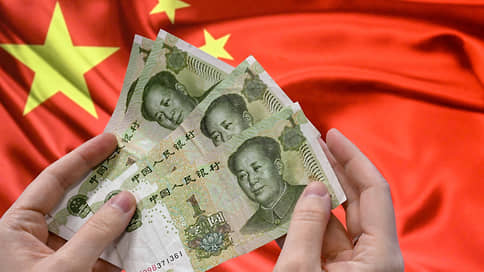Yuan split on the interbank market – Newspaper Kommersant No. 46 (7491) dated 03/20/2023
[ad_1]

In February, the total volume of interbank transactions in yuan in the Russian market for the first time exceeded 60 billion CNY, and a historical record of 28.5 billion CNY was set in repo transactions. Market participants explain the situation by the appearance last year in the Russian Federation of bonds denominated in yuan, against which banks lend Chinese currency to their colleagues in repo.
According to the Bank of Russia, in February, the interbank market set an absolute record for the volume of repos in yuan – 28.5 billion CNY. The previous record was also set this year – in January, repo transactions in yuan in the interbank market were CNY 26.8 billion, while last year the figure did not reach CNY 24 billion.
If we add the volume of interbank deposits to repo transactions, then in February an absolute record for operations in yuan was also set – 61.9 billion CNY.
The first repo transactions in yuan took place only last summer. They involve the pledge of securities denominated in Chinese currency, and bonds in yuan appeared on the Moscow Exchange just in July (see “Kommersant” dated July 28, 2022). Rusal was the first to close the order book for the placement of five-year bonds for CNY 2 billion, due to increased demand, the company decided to make another issue with similar parameters the day after the end of the application process. Prior to this, Russian companies placed instruments in yuan only on the foreign market.
To date, more than ten companies have already placed bonds in yuan on the Moscow Exchange, including Rosneft (30 billion CNY), Rusal (22.9 billion CNY), Nornickel (9 billion CNY), Polyus ( 4.6 billion CNY), Metalloinvest (3 billion CNY). Thus, there are more than 20 yuan bond issues on the Russian market worth more than CNY 70 billion.
As a result, Russian banks have received a new tool for attracting liquidity – interbank repo transactions in yuan, which are actively gaining popularity. Unlike interbank deposits in Chinese currency, the volume of which has a noticeable volatility, the growth of repo transactions in yuan, the volume of which in October last year for the first time exceeded the volume of interbank transactions in euros and dollars, shows a positive trend every month.
According to the head of Realist Bank Vladimir Elmanin, repo transactions against bonds issued in yuan usually take place for a month at 2-2.5% per annum, mainly corporate clients who conduct foreign economic activity in Chinese currency attract funds. “It is difficult to say how large such placements will reach, but it is obvious that companies that conduct foreign economic activity in yuan are interested in attracting in this currency, since the attraction rates for them are much lower than in rubles,” the banker explains. He notes that before the sanctions, Russian companies often attracted a lot of funds at low rates in dollars and euros, and now it is beneficial for them, if possible, to replace these falling volumes with loans in yuan.
Meanwhile, experts disagreed about the prospects for the yuan repo market.
Thus, Anatoly Perfilyev, Junior Director for Banking Ratings at Expert RA, agrees that against the backdrop of difficulties with transactions in dollars and euros that have arisen as a result of sanctions, interest in transactions in Chinese currency has grown.
“Various instruments are used to meet the yuan demand – this is the issue of bonds in yuan, currency swaps, as well as repos, which are issued on the security of clearing participation certificates or on the security of securities admitted to trading in transactions with a central counterparty,” the expert notes. He believes that, taking into account the “continuing building of economic relations with China and the measures applied by the regulator to stimulate transactions in the yuan”, in the medium term, the growth of their volume, including repo transactions, may continue.
At the same time, independent expert Olga Ulyanova is sure that the potential for expanding the volume of interbank operations in yuan is quite limited, if only because “business with China will not be able to completely replace relations with countries that have now become “unfriendly””.
[ad_2]
Source link





